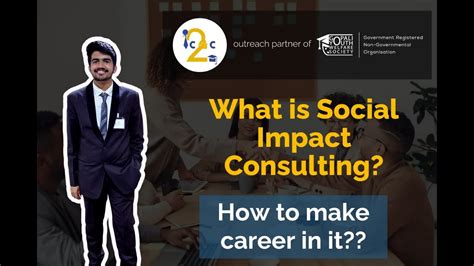Are you passionate about creating positive social change and making a meaningful impact on the world? Have you considered a career as a social impact consultant? In this blog post, we will explore what it takes to become a successful social impact consultant and make a difference in the world. From understanding the role of a social impact consultant to developing the necessary skills and qualifications, identifying target areas for social impact, and creating impactful strategic plans, we will cover everything you need to know to embark on this rewarding career path. We will also delve into the importance of engaging stakeholders for effective collaboration, implementing and monitoring social impact initiatives, and measuring and evaluating the success of projects. Additionally, we will discuss the role of technology in increasing impact, as well as building a strong network and showcasing your expertise in the field. Join us as we explore the fascinating world of designing for impact and becoming a social impact consultant.
Table of Contents
Understanding the role of a Social Impact Consultant
As a Social Impact Consultant, it is essential to have a deep understanding of the various elements that contribute to social change and development. This role requires not only a strong sense of empathy and compassion for the communities in need, but also the ability to develop and implement effective strategies for creating positive and sustainable impact.
In order to excel in this role, one must possess excellent communication and interpersonal skills to engage with a wide range of stakeholders including NGOs, government agencies, businesses, and local communities. Furthermore, a strong analytical and research-oriented mindset is crucial for identifying and understanding the root causes of social issues, as well as measuring the impact of interventions.
Another key aspect of the role of a Social Impact Consultant is the ability to leverage technology and data to enhance the effectiveness and reach of social impact initiatives. From utilizing data analytics to identify target areas for intervention, to leveraging social media and digital platforms for community engagement, a strong understanding of technology is essential in today’s digital age.
Overall, the role of a Social Impact Consultant requires a multi-faceted approach that combines empathy, strategic thinking, research, and innovation to drive meaningful and sustainable social change.
Developing skills and qualifications needed
Developing the right skills and qualifications is essential for anyone looking to make an impact in the field of social consulting. Acquiring relevant skills such as project management, data analysis, and stakeholder engagement is crucial in order to effectively address social issues and drive positive change. Having a solid educational background, such as a degree in social sciences, economics, or public policy, can provide a strong foundation for understanding the complexities of social impact work.
Additionally, gaining practical experience through internships, volunteer work, or entry-level positions in the social impact sector can greatly enhance one’s qualifications. This hands-on experience allows individuals to apply their knowledge in real-world settings, learn from seasoned professionals, and gain insight into the various challenges and opportunities within the field.
Furthermore, continuing education and professional development are key aspects of skill development. Attending workshops, seminars, and industry conferences, as well as pursuing specialized certifications in areas such as sustainability, corporate social responsibility, or social entrepreneurship, can further enrich one’s skills and qualifications.
Lastly, building a diverse skill set that encompasses both technical abilities and soft skills, such as communication, empathy, and cultural competence, is essential for success in the field of social impact consulting. This multifaceted approach enables individuals to navigate complex social challenges, collaborate with diverse stakeholders, and drive meaningful change within communities and organizations.
Identifying target areas for social impact
title: Identifying target areas for social impact
content:
Identifying target areas for social impact is a crucial step in creating effective social change. Organizations and individuals looking to make a difference in their communities must first assess the specific areas where their efforts will have the most meaningful impact. This involves conducting comprehensive research to understand the needs and challenges facing the target population, as well as identifying key stakeholders who can provide insight and support for potential initiatives.
Once the target areas have been identified, it is important to analyze the root causes of the issues at hand, in order to develop strategic and sustainable solutions. This process may involve collaborating with community members, local organizations, and experts in the field to gain a deeper understanding of the social and environmental factors contributing to the challenges being addressed.
In addition, it is essential to consider the potential risks and limitations associated with each target area, as well as the feasibility of proposed interventions. By carefully evaluating these factors, social impact professionals can ensure that their efforts will result in meaningful and lasting change.
Ultimately, the process of identifying target areas for social impact requires empathy, research, and collaboration to create effective solutions that address the most pressing needs of the communities being served.
Conducting thorough research and analysis
Conducting thorough research and analysis is an essential component of any social impact initiative. It involves gathering, interpreting, and evaluating data to gain a comprehensive understanding of the challenges and potential solutions within a given context. Whether it’s identifying community needs or assessing the impact of existing programs, this process is crucial for informing strategic decision-making and problem-solving.
When conducting research, it’s important to use a variety of methods such as interviews, surveys, observations, and document analysis to collect relevant data. Each method offers unique insights and helps to paint a more complete picture of the socioeconomic factors at play. Analyzing this data is equally important, as it allows for the identification of trends, patterns, and knowledge gaps that can inform the development of effective social initiatives.
Thorough research and analysis also involves engaging with a diverse range of stakeholders including community members, leaders, experts, and organizations to gain multiple perspectives and insights. This collaborative approach not only enhances the quality of the research but also ensures that the resulting strategic plans are well-informed and sustainable.
In conclusion, conducting thorough research and analysis is vital for any social impact consultant looking to develop effective and sustainable initiatives. By gathering and analyzing data, engaging with stakeholders, and using various research methods, consultants can gain the insights needed to make well-informed decisions and drive positive change in the communities they serve.
Creating impactful strategic plans
Creating impactful strategic plans is an essential part of any organization’s efforts to make a positive social impact. Strategic plans are the roadmap that guides an organization on how to achieve its goals, and when it comes to social impact, the stakes are high. A well-crafted strategic plan can help an organization identify and prioritize the areas where it can make the most difference, align its resources and efforts towards those goals, and measure the impact of its activities over time.
One key aspect of creating impactful strategic plans is the process of stakeholder engagement. This involves actively involving the people who will be affected by the organization’s activities, as well as those who have the power to support or hinder its efforts. By engaging with stakeholders, an organization can gain a better understanding of the needs and perspectives of the community it seeks to serve, build relationships that will support its work, and gain valuable insights that can inform its strategic planning process.
Another important element of creating impactful strategic plans is goal setting and prioritization. Organizations must carefully consider the most pressing social issues in their target areas, as well as their own capabilities and resources, to set realistic and impactful goals. Prioritizing these goals will help the organization focus its efforts and resources where they can have the most meaningful impact.
Finally, measuring and evaluating the success of strategic plans is crucial to ensure that the organization is making a positive social impact. By collecting and analyzing data on its activities and the outcomes they have achieved, an organization can learn from its experiences, make necessary adjustments to its plans, and demonstrate the value of its work to stakeholders and supporters.
Engaging stakeholders for effective collaboration
Engaging stakeholders for effective collaboration is a crucial aspect of any social impact initiative. It requires building relationships with individuals and organizations that have a shared interest in the project’s success. By involving stakeholders in the decision-making process, their buy-in and support can be secured, leading to more impactful outcomes.
One of the key strategies for engaging stakeholders is to communicate openly and transparently about the goals, progress, and challenges of the initiative. This helps to establish trust and credibility, creating a positive foundation for collaboration.
In addition to communication, it is important to actively listen to the perspectives and concerns of stakeholders. This demonstrates respect and inclusivity, and can lead to more innovative and effective solutions that leverage the expertise and resources of all involved parties.
Finally, successful engagement of stakeholders involves creating opportunities for them to contribute meaningfully to the initiative. This can include involvement in decision-making processes, project implementation, and evaluation, ultimately leading to a shared sense of ownership and commitment to the project’s success.
Implementing and monitoring social impact initiatives
Implementing and monitoring social impact initiatives is a critical step in ensuring the success and effectiveness of any social impact project. It involves putting the plans and strategies into action, and then closely tracking the progress and outcomes to make necessary adjustments and improvements.
Once the strategic plans have been developed, it is essential to set specific timelines and milestones for implementation. This helps in ensuring that the initiatives stay on track and are completed within the set timeframe. It also allows for regular check-ins to measure progress and address any issues or roadblocks that may arise.
In addition to the actual implementation, monitoring the social impact initiatives also involves collecting and analyzing relevant data and metrics to evaluate the effectiveness and success of the projects. This includes tracking the outcomes and measuring the impact on the target areas and communities, as well as assessing the overall performance against the initial goals and objectives.
Implementing and monitoring social impact initiatives requires a strong commitment to accountability and transparency. It is important to communicate regularly with stakeholders and partners, providing updates on the progress and sharing any challenges or learnings along the way. This creates a culture of continuous improvement and ensures that the projects are responsive to the needs and feedback of the communities they aim to serve.
Measuring and evaluating the success of projects
Measuring and evaluating the success of projects is a crucial aspect of any social impact initiative. It involves assessing the effectiveness and impact of the projects in achieving their goals and objectives. This process helps in determining whether the planned activities have resulted in the desired outcomes and have made a positive difference in the target communities.
One of the key components of measuring and evaluating the success of projects is setting clear and measurable indicators of success. These indicators can be both quantitative and qualitative, and should be realistic and achievable. By defining these indicators at the onset of the project, it becomes easier to track progress and evaluate the impact of the activities.
Furthermore, it is important to gather relevant data and evidence to support the evaluation process. This may involve collecting information through surveys, interviews, case studies, and other research methods. The data collected should be analyzed carefully to identify trends, patterns, and areas of improvement.
Ultimately, the measurement and evaluation process allows social impact consultants and organizations to learn from their experiences and make informed decisions for future projects. It helps in identifying what has worked well and what needs improvement, and provides insights into how to maximize the impact of their initiatives.
Leveraging technology for increased impact
As a Social Impact Consultant, it is crucial to stay updated with the latest advancements in technology in order to effectively leverage it for increased impact. Technology can be a powerful tool to reach a wider audience, streamline processes, and measure the success of social impact initiatives.
One way to leverage technology for increased impact is by utilizing data analytics and artificial intelligence to gain valuable insights into the target areas for social impact. By analyzing data, social impact consultants can identify the most pressing issues and develop strategic plans to address them effectively.
In addition, leveraging technology also involves utilizing digital platforms and online channels to engage stakeholders and collaborate more effectively. Social impact consultants can use social media, online forums, and virtual meetings to bring together diverse voices and expertise for impactful collaborations.
Furthermore, technology can also be used to measure and evaluate the success of social impact projects. Through data tracking and monitoring tools, consultants can assess the effectiveness of their initiatives and make data-driven decisions for continuous improvement.
Building a network and showcasing expertise
Building a strong network is essential for a social impact consultant to expand their reach and make a difference in the community. This involves connecting with individuals and organizations that share similar goals and values, and can provide valuable insights and resources. By actively participating in networking events, joining relevant forums and organizations, and reaching out to potential collaborators, a consultant can build a diverse and supportive network that can amplify their impact.
Furthermore, showcasing expertise is crucial for gaining credibility and attracting opportunities for collaboration and projects. Consultants can do this by sharing their knowledge and experience through public speaking engagements, publishing articles or blogs, and participating in panel discussions. By establishing themselves as thought leaders in their field, consultants can demonstrate their expertise and attract potential partners and clients.
It’s also important for social impact consultants to utilize social media and online platforms to showcase their work and build a strong online presence. This can be done through creating engaging content, sharing success stories and testimonials, and actively engaging with the community. By leveraging the power of social media, consultants can reach a wider audience and attract potential collaborators and supporters.
Overall, building a network and showcasing expertise are essential for social impact consultants to expand their reach, gain credibility, and attract opportunities for collaboration and projects. By actively engaging with the community, leveraging online platforms, and establishing themselves as thought leaders, consultants can build a strong network and showcase their expertise to make a meaningful impact.






